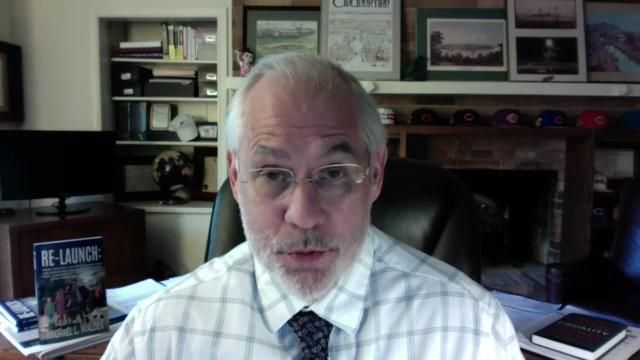NC economist: We could be heading into our next recession
With prices seemingly on the rise everywhere you turn, Dr. Mike Walden, an economist and professor at North Carolina State University, believes we could be headed for another recession.
Posted — UpdatedWith prices seemingly on the rise everywhere you turn, Dr. Mike Walden, an economist and professor at North Carolina State University, believes we could be headed for another recession by the end of the year.
Walden expressed concerns about the economy during an exclusive interview with WRAL News. The discussion focused on gas prices, which are on a slow decline since North Carolina hit the highest recorded gas price in state history, $4.38, in March.
Even though gas prices are slowly improving, Walden said the rise in the cost of gas, groceries and other essentials is preventing people from spending money on other things.
"Most people have to drive some amount of time or some distance to their work," he said. "People live on a budget. They don't really have maybe an option ... they have to get to work, they have to school. So it's taking money away from other things that they could buy ... and I think this is going to have a major impact on the overall economy going forward."
Walden said the economy has done fairly well since improving from the COVID-19-related recession, but a variety of elements -- including higher interest rates -- could change that.
"I think we could see a slower growing economy in the nation as well as in North Carolina going forward," he said.
"If you listen to economists, you'll hear a lot of economists say the 'R word' ... that we might may actually have a recession at the end of the year," Walden added. "I'm putting it 25% to 33%."
In some ways, the economy has improved, Walden explained, but the war in Ukraine, along with inflation, could change things.
"A lot of economic metrics are actually better than they were two years ago," Walden said. "But we're in a different world now."
Walden also expressed concern over the Federal Reserve, the U.S. central banking system, and its impact on the housing market.
"They're going to shift their policies from trying to promote economic growth to trying to slow economic growth," he said. "And the direct way we'll see that is through higher interest rates ... so anyone who's trying to buy a house or buy a car or anything like that, those big ticket items, I think it's going to be much more expensive, which means fewer people will do that, which means that segment of the economy will slow down."
Regarding gas prices, Walden expects they will continue to decrease, but slowly.
"I think what a lot of drivers notice is how gas prices seem to go up very quickly when oil prices go up, but they come down much more slowly when oil prices go down," he said. "So that's the big question and I think that frustrates drivers."
Walden said he is "cautiously optimistic" when it comes to the question of where gas prices are going.
“For where gas prices are going in the next few months, I think they will trend downward,” Walden said. “If I had to give a point estimate, I say we could maybe get close to 3.60 [or] 3.50 [per gallon].”
Although prices are lower now, Walden says they are not low enough for people to feel comfortable just yet. Unless prices continue to drop, we may see less driving this summer.
• Credits
Copyright 2024 by Capitol Broadcasting Company. All rights reserved. This material may not be published, broadcast, rewritten or redistributed.






